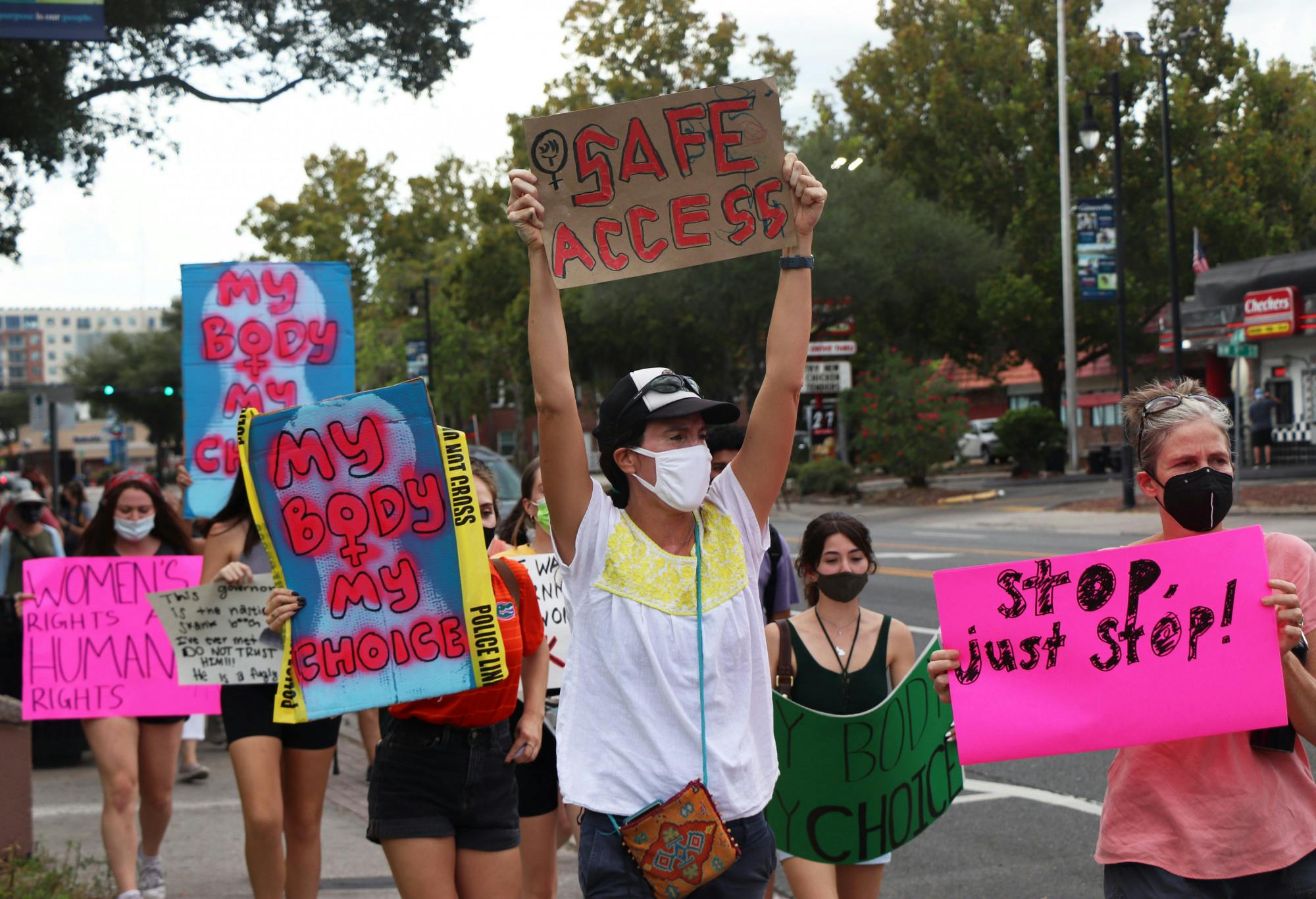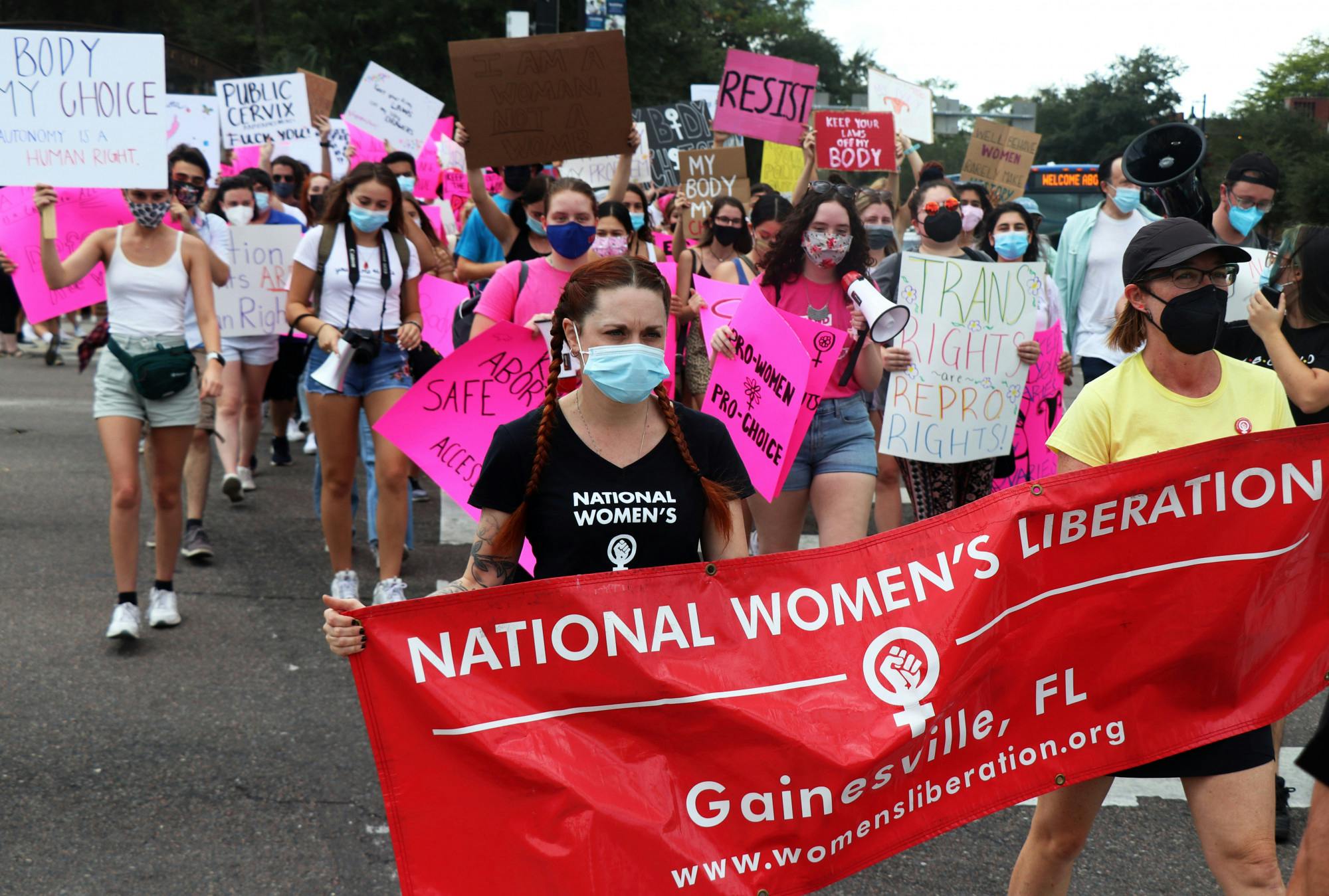MaryAnn Riggs remembers protesting anti-abortion legislation in the 1970s. Over 50 years later, she brought the same energy to Saturday’s North Central Florida March for Reproductive Rights & Justice.
The 66-year-old Ocala resident held up a sign that read, “I can’t believe I have to protest this sh-- again.”
“You really have to let your voice be known nowadays,” she said. “If you don't stand up and say what you believe in, it will disappear. You can't take that right for granted anymore.”
Alongside 650 other Women’s March events happening simultaneously across the country, Gainesville pro-choice advocates marched in a rally Oct. 2. Activists highlighted reproductive issues, such as access to abortion and menstrual products, equitable prison birth conditions and Florida's Heartbeat Act bill proposal.
Three hundred North Central Florida residents joined the national movement in two separate marches — one starting at Depot Park and the other starting at University Avenue and Northwest 13th Street.
The march was organized by a coalition of 10 organizations and people, ranging from student groups like UF College Democrats to community activist groups like North Central Florida Indivisible and the Gainesville chapter of the National Women’s Liberation Movement.
Danielle Hawk and Amol Jethwani led a crowd of over 200 marchers from Depot Park to Cora P. Roberson Park, as they chanted, “No Justice; No Peace,” and “Here to stay: Roe v. Wade.”

Hawk, a 27-year-old Democratic candidate for Florida's 3rd Congressional District, said abortion access is a personal issue for her as someone of reproductive age. Reproductive rights are a large part of her campaign’s platform, she said.
As an organizer of the event, Hawk said the march was planned to highlight the local issues occurring in Florida and Alachua County.
She said the event was important in bringing Gainesville’s two often-divided parts together: the university and the residential area.
“It's almost symbolic to show our community coming together from different walks of life — and literally from different walks — coming together to the rally to unite with one another and to say, loud and clear, that anti-choice legislation has no place here,” Hawk said.
Simultaneously, another group from University Avenue and 13th Street marched down University Avenue and Southwest Sixth Street behind a banner that read, “National Women’s Liberation.”
Rachel Wolfrey, a 20-year-old UF political science and public relations junior, set up a giveaway of 24 morning-after pills provided by Planned Parenthood Generation Action.
Wolfrey said she’s proud to be a part of making history by marching alongside the other 650 marches happening across the country.
“I am one very pissed-off woman,” Wolfrey said. “I am not going to sit silently or complacently while my rights are being taken away.”
Kiara Laurent and Karine Dieuvil, members of GoDDsville Dream Defenders, pointed to the case of Erica Thompson, who gave birth inside a jail cell in August and lost her child, as an example of the treatment.
Laurent said Thompson’s case speaks to how Black pain is often ignored.
“I'm here standing for Erica Thompson because Black women should be believed the first time,” Laurent said. “When I say I'm in pain, I ain’t lying. It hurts.”
Cara Loudermilk, a 24-year-old Gainesville resident, marched from Depot Park holding a sign that read, “If men could get pregnant, abortion clinics will be on every block like Starbucks.”
“The abortion laws are all about oppressing women,” Loudermilk said. “They don't actually care about babies.”
Loudermilk said abortion clinics are important, especially because having babies can be dangerous for some people, and some almost die giving birth.
“It changes your body permanently,” Loudermilk said. “God forbid you don't want to give it up, and you don't even get government assistance a lot of the time.”
Krista Hogun-Knight, a 40-year-old Gainesville resident, is a mother of three. She brought her 10-year-old son to the protest in hopes of being open and honest with her kids about political and social issues.
Hogun-Knight said choosing to be a mother is the hardest decision in the world.
“Every child should be a wanted child, and every parent should want to be a parent,” Hogun-Knight said.
Also marching from Depot Park, Fred Sowder, a 51-year-old Gainesville resident, held up a sign that read, “Time 2 Mess with Texas.”
He said a Texas-style abortion ban has no place in Florida.
During the summer, Texas passed H.B.1500, otherwise known as the Texas Heartbeat Bill. The bill bans abortions once an ultrasound can detect a fetal heartbeat.
“We don't want the same law that passed in Texas here in Florida,” Sowder said. “Women should have the right to choose. Without question, unapologetically, abortion should be available free on demand whenever needed.”
The two marches eventually met at Cora P. Roberson Park, accumulating over 300 attendees. The attendees were greeted by the organizers who set up tables at the entrance and live music.
On the outskirts of the park, however, were a handful of anti-abortion counterprotesters.

Jennifer Friend, a 54-year-old Alachua County resident, said she heard about the national movement of women’s reproductive rights marches and looked online for a local one to attend.
But Friend had a different reason than most for attending the rally.
As hundreds of marchers poured into Cora P. Roberson Park, Friend waited on the sidewalk holding a sign that read, “Don’t spread your legs.”
Friend said there are other options besides abortion and describes herself as a pro-lifer. She supports Texas’ Heartbeat Act and would support it if Florida replicated something similar.
“We already killed too many babies as it is,” Friend said. “It’s affecting all communities ... It's just not right. Those babies have a right to live, and just because you don't have the money to raise them or you don't want to raise them doesn't mean they don't have the right to be on this Earth.”
Chanae Jackson, a 42-year-old East Gainesville resident and activist, said the issue has become very personal for her. She had to rush her 17-year-old daughter J’Niyah Gilbert to Orlando Regional Medical Center Sept. 28 because of a menstrual problem.
One of the solutions that might have been needed to solve J’Niyah’s medical issue was birth control.
“People don't understand that it's bigger than somebody needing birth control to decide if they want to have sex or not,” Jackson said. “It actually is that meaning between the difference of life and death. I want us to think bigger.”
Elected officials like Gainesville City Commissioner David Arreola and Alachua County Commissioner Anna Prizzia also showed their support for the cause.
Arreola said he’s urging Florida residents to acknowledge that an attack on abortion rights is not hypothetical. With a Texas-style abortion ban working its way through the state legislature, the attack is already happening.
“I wanted to be here today because I think that the bill that was recently filed in the Florida House is a direct attack on women's rights,” Arreola said. “Being here today, I think, is a statement to everybody, particularly Senators Keith Perry and Chuck Clemons, who are going to have to vote on this legislation.”
Contact Jiselle at jlee@alligator.org. Follow her on Twitter @jiselle_lee.
Jiselle Lee was The Alligator’s Summer 2023 Editor-In-Chief. She was previously a reporter with NextShark News and a reporting intern at The Bradenton Herald.





